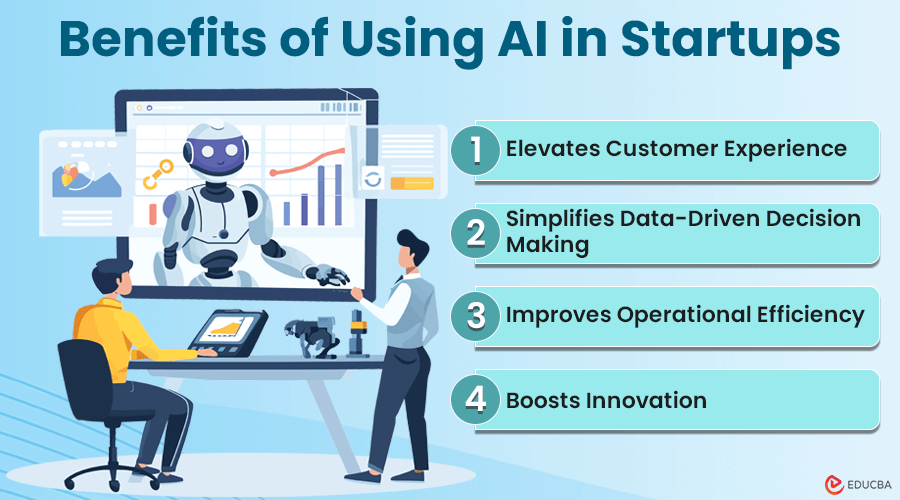AI in Startups: Overview
Using AI in startups for business planning helps firms to analyze large amounts of data, understand customer preferences, and competitor strategies quickly. The AI algorithms also help segment the target audience based on age, location, and interests. Overall, AI tools streamline tasks, which saves time and reduces costs. Thus, integrating AI into your startup’s business planning process can provide valuable insights and increase your chances of success.
Benefits of Using AI in Startups
There is a compelling reason AI is taking center stage in the startup world. According to the PWC Artificial Intelligence Study, it estimates that the potential contribution of AI to the global economy can be up to $15.7 trillion by 2030. Let’s delve deeper into how AI empowers startups:
1. Elevates Customer Experience
AI chatbots are powered by Natural Language Processing (NLP), and provide 24/7 personalized customer support, boosting satisfaction and loyalty. A Salesforce research study found that 73% of customers want companies to know what they need and expect. Startups in different industries can use AI to make customers happier in many ways.
In online shopping, AI chatbots can help customers find products they like and answer shipping questions.
2. Simplifies Data-Driven Decision Making
AI algorithms can analyze vast datasets to identify patterns and predict future trends. This helps startups make data-driven decisions on marketing, resource allocation, product development, and pricing strategies. With AI-powered insights, startups can optimize operations, reduce costs, and make more informed strategic choices.
3. Improves Operational Efficiency
AI improves operational efficiency by automating repetitive tasks, making decisions faster, and optimizing processes. It analyzes data quickly, predicts future trends, and suggests improvements.
A digital marketing startup can employ AI to analyze social media data, identify trending topics, and automate ad placements.
4. Boosts Innovation
AI in startups boosts innovation by guiding firms in taking a creative outlook at various departments such as product manufacturing, marketing, etc. It can help with innovative design ideas or optimal product functionality tips. Thus, AI and humans working together make innovation happen quicker and easier in many areas of life.
Suppose a startup creates an app for better traffic management. For this, they use AI to analyze live traffic data from cameras, sensors, and GPS in the city. This helps manage traffic better, reducing jams and making travel smoother.
Things to Consider While Integrating AI in Startup’s Business Plan
Understanding the benefits of AI is just the beginning. To integrate AI strategically into your business plan, consider the following key points:
1. Identify a Clear Problem and Value Proposition
Avoid implementing AI just for the sake of it. Startups must thoroughly identify areas where AI can provide significant value. Your AI solution should address real problems and deliver tangible benefits to your customers, setting you apart from competitors.
2. Start Small and Scale Up
Developing complex AI solutions can be costly and time-consuming. As advised by Dayna Jones from Top Pitch Deck Consultants., “Begin with a focused AI application that addresses specific customer problems. This approach allows you to validate the AI’s effectiveness and demonstrate its value proposition before expanding further.”
Starting small minimizes risk, enables learning from early iterations, and allows for the gradual expansion of AI capabilities as your startup grows.
A startup starts using AI to manage inventory better. Based on sales data from one location, their system predicts which product will sell well and bring in more profits. By using this data, the startup gradually expands to other locations as it grows.
3. Build a Team with the Right Skills
Having the right team is important. While you may not need a full team of AI experts in-house, you can use a business plan writer, look for individuals with AI knowledge, or partner with AI development firms. Look for talent with expertise in data analysis, machine learning, and software development. Consider partnering/collaborating with universities or research institutions to tap into cutting-edge AI research and talent pools.
4. Data is Important to Build Business
AI relies on data. Plan how to collect, store, and manage the data needed to train your AI models. Ensure compliance with data privacy regulations like CCPA (California Consumer Privacy Act), and GDPR (General Data Protection Regulation). Develop robust data governance frameworks to maintain your data assets’ quality, security, and ethical use.
5. Ethical Considerations
AI algorithms can carry over biases from the data they train on. It is important to incorporate ethical considerations into your business plan from the start. Develop frameworks to ensure your AI solutions are fair and unbiased in their decision-making processes. Engage with diverse stakeholders and consider the societal impact of your AI applications. Prioritizing ethics builds trust with your customers and stakeholders.
Final Thoughts
Integrating AI in startups is important for the future of all businesses. The AI development covers everything from the initial idea to full implementation, ensuring your vision comes to life accurately and efficiently.
Recommended Articles
We hope you found this article on “AI in Startups” informative. The following recommendations can help you learn about similar concepts.


